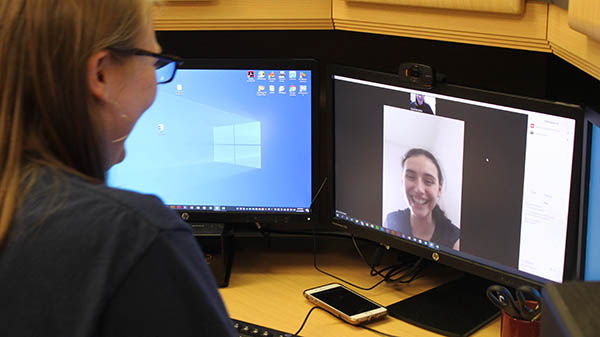When adult children turn away from all their Christian parents believe and have taught them, relationships can be completely severed, leaving parents in agony and with no idea of where to turn for help. While many churches offer support groups for parents of prodigal teens, the issue of prodigal adult children is one that is often neglected.
Phil Waldrep, a Trinity-based evangelist, Christian radio show host and author of “Parenting Prodigals,” said the need for such support is there.
“I believe as many as 50 percent of all senior adults have at least one child they would consider a prodigal,” he said without hesitation. Prodigal is used in reference to the biblical story of The Prodigal Son in Luke 15.
Janet Baker, an Alabama Baptist, agreed.
“The first time I publicly asked for prayer for us and our prodigal, I was in a seminary class with over 20 other women. It was like a floodgate opened. Six other ladies in that classroom — including our instructor — shared that they, too, had prodigals.”
Her husband, Lonnie, recalls how hard it was to begin requesting prayer for their wayward son.
“When Micah first broke communication with us, we were crushed and embarrassed. We didn’t think any of our fellow church members could relate to what we were going through. Now I know close to a dozen men in our church who are also fathers of prodigals.”
With such a high percentage of parents dealing with adult prodigals, why do so few churches offer support groups?
Fair Brocard, co-founder of Prodigal Child Ministries (PCM), is certain it’s because they don’t see the need.
“People put up a façade. They hide behind their smiles,” she said.
Many parents blame themselves. They believe there had to be some mistake in their parenting that led their child to become a prodigal.
David, a member of an Alabama Baptist church and the father of three adult prodigals, maintains that his divorce was the trigger for his children’s break with him.
“It’s been over two years since I’ve heard from either of my sons, and my daughter only contacts me sporadically.”
Waldrep has witnessed this type of thinking countless times, which is why the first of the six principles in his book is to learn to live guilt-free.
“Your prodigal has choices. … He is responsible for his own behavior. … Even if we had been perfect parents, we couldn’t guarantee a child’s godliness,” he wrote.
Irene Bennett, president of www.TheParentsGroup.com, concurred.
“Ninety-nine percent of the parents didn’t do anything intentionally to push their prodigals away from the Lord. They did the best they could,” she said.
Four years ago, Trish and her pastor husband, Mitch, were bowled over when their 18-year-old son Kyle confessed a same-sex attraction. He ended up leaving home and refraining from contact for about a year but now stays in touch and returns home for occasional visits.
Many factors contributed to his decision to walk away. For one, Trish said, “the church’s silence on the issue of homosexuality other than to condemn it gave Kyle nowhere else to discuss his very real feelings.”
While keeping their focus on God, Trish and Mitch have found a local chapter of Exodus International, the world’s largest Christian organization dedicated to helping families and individuals impacted by homosexuality, to help them in their relationship with Kyle.
“We’re staying loaded up on reading materials about grace and God’s unconditional love — things that help us see our prodigal through His eyes,” Trish said.
And there is more help for parents of adult prodigals.
PCM offers online help at www.prodigalchildministries.org, as well as a 10-week Bible study, during which up to 20 participants learn how God wants parents to react when their child is a prodigal.
“We have a waiting list of parents wanting to be a part of the study,” Brocard said. “In all churches, there are parents of prodigals, and the prevalence is increasing by the day. That’s why we encourage people who’ve gone through our study to take it back to their home churches.”
Bennett’s website hosts an online prayer conference call every Tuesday night at 9 p.m. EST.
Brocard pointed out that even though parents aren’t responsible for their child’s choice to take the prodigal pathway, they oftentimes are enablers.
“When we ask a former prodigal what finally got his attention, we often hear, ‘My parents stopped enabling me,’” she said.
Linda Randow, founder of www.ParentsOfProdigals.com, echoed her words.
“We have to be so careful not to enable a prodigal,” Randow said. “The main thing is to love unconditionally and pray continually.”
Chris Adams, senior lead women’s ministry specialist with LifeWay Christian Resources, has similar advice after going through her own prodigal experience with her daughter Alycia.
“Release the prodigal to a God who loves her (or him) more than we do. Pray for Him to put Christian influences in her life who will nudge her back to Him and to her family,” said Adams, whose daughter has been reunited with her family and now shares her testimony.
Janet Baker said it is also important to remember you’re not alone.
“When you’re courageous enough to open up and admit that prayer need, you’ll find that there are many more parents within your own church who are struggling with the very same issue.
“Don’t do anything to publicly embarrass your prodigal, but enlist the help of trustworthy believers to pray for you and your prodigal, and if the Holy Spirit leads, approach your church staff about beginning a support group.”
EDITOR’S NOTE — Some names have been changed.
——————————————
Helpful websites
www.ExodusInternational.org
www.Parents-Of-Prodigals.com
www.ParentsOfProdigals.com
www.ProdigalChildMinistries.org
www.TheParentsGroup.com
——————————————
Resource books
- “A Long Way Off” by Kitti Murray
- “Bringing Home the Prodigals“ by Rob Parsons
- “Encouragement for the Broken-hearted Parent“ by Leslie J. Barner
- “Parenting Prodigals“ by Phil Waldrep
- “Praying for Your Prodigal Daughter: Hope, Help & Encouragement for Hurting Parents“ by Janet Thompson
- “Prodigals and Those Who Love Them: Words of Encouragement for Those Who Wait“ by Ruth Bell Graham
- “Setting Boundaries With Your Adult Children: Six Steps to Hope and Healing for Struggling Parents“ by Allison Bottke
- “The Hope of a Homecoming: Entrusting Your Prodigal to a Sovereign God“ by Brendan O’Rourke & DeEtte Sauer
- “The Hurting Parent“ by Margie M. & Gregg Lewis
- “Until Your Prodigal Comes Home: Encouragement Along the Way” by Irene Bennett (to be released later this year)
- “Will Your Prodigal Come Home? An Honest Discussion of Struggle & Hope” by Jeff Lucas





Share with others: